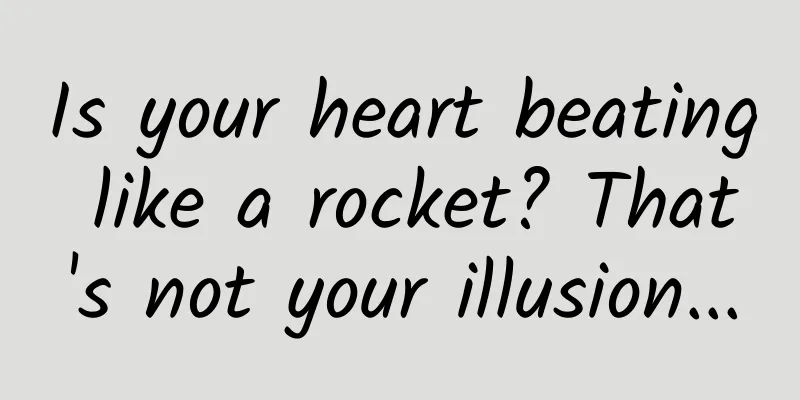Is your heart beating like a rocket? That's not your illusion...

|
Author: Liu Yanan Beijing General Hospital of Civil Aviation Reviewer: Guo Shubin, Chief Physician, Beijing Chaoyang Hospital, Capital Medical University Is your heart always pounding and feeling like it’s about to jump out of your throat? Some people don't take it seriously, thinking that it is caused by working too hard, sleeping too late, or being too nervous. In fact, this is a dangerous signal sent by the heart to you, and your heart may have problems. Figure 1 Copyright image, no permission to reprint 1. What is the reason for “my heart always feeling anxious and pounding”? In a quiet state, a normal person's heart beats 60 to 100 times per minute. If it exceeds 100 times, it is tachycardia, also known as palpitations. At this time, you should pay attention. Tachycardia can be divided into two types: physiological and pathological. Physiological causes are common in heavy physical labor, strenuous exercise, excessive excitement and tension, and can also be seen after smoking, drinking tea or coffee, and drinking alcohol; in addition, pregnancy can also cause palpitations. Pathological causes include many types, the most common of which are fever, hypoglycemia, hyperthyroidism, anemia, shock, myocardial ischemia, congestive heart failure, rheumatic heart disease, and arrhythmias caused by the use of drugs such as epinephrine and atropine. If it is a physiological cause, it generally does not require special treatment and will disappear on its own; if it is a pathological arrhythmia, the primary disease needs to be actively treated, and medication and interventional treatment may be needed if necessary. Figure 2 Copyright image, no permission to reprint 2. How to deal with sudden tachycardia? Patients with tachycardia experience sudden and sudden palpitations, that is, tachycardia occurs suddenly and ends suddenly, and patients will feel panic or frightened. Some patients feel more intense and feel that their heart is about to "beat into their throat." Symptoms of common physiological tachycardia can be basically eliminated after the cause is removed. If the patient has diabetes, blood sugar should be monitored in time to avoid tachycardia caused by low blood sugar. If the palpitations are caused by low blood sugar, the palpitations will gradually ease after taking in sugary foods. Therefore, it is best for diabetic patients to carry candies with them when they go out. Tachycardia caused by young patients without organic heart disease is mostly supraventricular tachycardia. The following methods can be tried to terminate the attack: Ask the patient to cough loudly and forcefully, then take a deep breath and hold it, then repeat the breathing action. Let the patient stimulate his throat with his hands to induce nausea and vomiting, which can terminate the attack. Ask the patient to close his eyes and press the upper part of the eyeball with your fingers under the eye socket while feeling the pulse and counting the heart rate. If the tachycardia stops, stop pressing the eyeball immediately. Do this for 10 minutes each time. Be careful not to use too much force. Press the right eyeball first. If pressing one side does not work, switch to the other side. Do not press both sides at the same time. It should be noted that this operation is prohibited for patients with glaucoma and high myopia. Diving reflex method: This method can strongly stimulate the vagus nerve and is more effective for young children. You can soak a towel in ice water and apply it to the entire face of the child for 10 to 15 seconds each time, and test once every 3 to 5 minutes. For adults, let the patient hold his breath after taking a deep breath, and immerse the face directly in cold water for about 30 seconds. This method can be repeated after the patient rests for a few minutes. It is especially effective for paroxysmal supraventricular tachycardia that is difficult to control in adults. Note: There are many causes of tachycardia. If the symptoms are severe or you don’t know how to deal with it, you should go to the hospital in time to avoid delaying treatment! Figure 3 Copyright image, no permission to reprint 3. How do we protect heart health in daily life? To keep your heart healthy, we need to do the following in our daily lives: Control cardiovascular risk factors. For example, patients with hypertension should take medication as prescribed by their doctor to maintain normal blood pressure; patients with coronary heart disease or heart valve problems should receive timely treatment and pay attention to daily health management and constant monitoring of their condition. Maintain a good attitude. Avoid emotional fluctuations, avoid tension and anxiety, maintain a regular lifestyle, avoid overwork, and ensure adequate sleep. Do not overeat, eat a light diet and have a balanced diet. Avoid drinking stimulating beverages such as strong tea, coffee and spicy food. At the same time, you should adhere to salt and alcohol restrictions, eat more fresh fruits, vegetables and crude fiber foods, eat less fast food, and maintain a healthy life. Do proper exercise. Run for more than 30 minutes every day, and your heart rate can reach 120-140 beats per minute or more. This can not only increase the heart's tolerance, increase myocardial contractility, and improve heart function, but also effectively improve the metabolism of blood sugar and blood lipids. Control the primary disease, such as hypertension, diabetes, hypercholesterolemia, anemia, hyperthyroidism, organic heart disease, etc. Only when people have sufficient knowledge of the disease can they better prevent and treat it. I hope everyone can pay more attention to tachycardia. While discovering and actively treating primary diseases as early as possible, they should also pay attention to preventing and controlling tachycardia, go to the hospital for regular check-ups, and protect their heart health. References Guo Shubin. Practical Family Emergency Handbook. Beijing: Chinese Medical Electronic Audiovisual Publishing House. 2021.12. |
>>: Today's hot search made me cry...
Recommend
How big is the gap between Xiaomi's self-developed processor and Qualcomm and Huawei?
Recently, a new Xiaomi phone was exposed online wi...
The 5G era is coming. How long will it take for smartphones to become obsolete?
In different eras, due to the limitations of diff...
Lin Yao | Reaching more possibilities through scientific research
At the beginning of 2023, the Chronic Disease Man...
The sky is falling, disposable chopsticks are bleached with sulfur dioxide! ?
I don’t know if you have seen such news online, s...
Attacking India: Why domestic mobile phones are unable to defeat local giants
Since last year, as the domestic mobile phone mar...
Latest Age Regulations for Construction Workers 2022: What is the age limit for migrant workers on construction sites?
In rural areas, many farmers are forced to work i...
Rare! This tree can live for thousands of years, and it can be found in Hainan →
In the Xiaodongtian Scenic Area in Sanya, Hainan,...
Xiaomi releases mobile phone processor: worth 100 million yuan, still born for enthusiasts!
On February 28, Beijing time, Xiaomi released its...
Product attracting new customers strategy!
As the Internet enters the second half, the price...
Yin Chaowen, Ashtanga Level 1 Advanced Course "Preparation for Advanced Level 2"
Yin Chaowen, Ashtanga Level 1 Advanced Course &qu...
WeChat 8.0.10 is fully updated. These 7 features are particularly useful. Have you discovered them?
This time, WeChat version 8.0.10 has been fully u...
Carbon Science | What is the grid emission factor in the dual-carbon economy?
The grid emission factor is a key parameter for e...
The new Three Kingdoms of the display industry: Japanese companies retreated, Korean companies dominated OLED, and Chinese companies broke through Mini LED
In today's international competition, high te...
Why do some people burp smell? It may be because they haven't farted yet.
I finally squeezed into the elevator A burst of &...
"Illustrated Guide to Ancient Chinese Weapons" - 5000 Years of Swords and Blades
To achieve true peace You must understand the rea...









